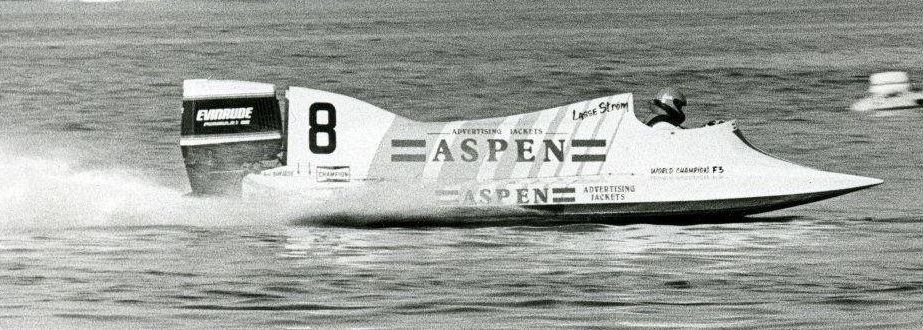It was a case of mistaken identity that time when a security guard forced the CEO off the dock at a boat race. Who knew this older gentleman in the big straw sun hat, wearing his trousers high and a camera around his neck like a tourist, was in fact the man paying for the race. He wasn’t wearing the required credentials. And so, despite his protestation, Charles D. Strang, CEO of Outboard Marine Corporation, was escorted off the starting dock just before his fleet of Johnson- and Evinrude-powered Formula 1 tunnel boats blasted off with a howl of two-stroke horsepower.
The old man was pissed.
This now-humorous incident is one of the memories I have of Charlie Strang, who died in March at age 96. Well-known to industry insiders, Strang never had the public name recognition of more flamboyant personalities like Evinrude or Kiekhaefer or Aronow, but his impact on pleasure boating was profound. In 1947, Strang sketched out a design for a sterndrive while working as a research associate at MIT. In 1951, he became director of research at Kiekhaefer Mercury and immediately showed his idea to Carl Kiekhaefer, who thought he was nuts. Strang then conspired with others to produce the sterndrive behind Kiekhaefer’s back, which resulted in the 1959 introduction of the Volvo Penta Aquamatic, the original inboard/outboard. Strang’s improved design debuted as the original MerCruiser in 1961 (Kiekhaefer changed his mind). Strang jumped to OMC as director of marine engineering in 1966 and retired as board chairman in 1993.
Strang loved outboard racing and was instrumental in getting the Johnson and Evinrude brands back into competition in 1967. Previous leadership considered racing a waste of money. Strang saw it as a testing ground. He directed the creation of the U.S. Formula 1 series that ran from 1984 to 1990, heavily supported by OMC to showcase the 3.5-liter V-8 racing outboards.
I was the most junior OMC PR buckaroo in 1985 when Strang was booted from a floating dock prior to the Chattanooga Grand Prix. Strang enjoyed the perks of his position and would fly in on race day aboard the OMC King Air. One of my tasks was to set up the boss’s rented motor home parked in the pits. I got the air conditioning blasting, set out a packet of news clippings documenting our PR efforts, and arranged fresh fruit and chilled white wine for his secretary at the time, Barbara.
After being kicked off the dock, Strang stewed in the motor home and then refused to sign the purse checks until someone was fired. He finally settled down and signed. Before the next race, however, race director Barry Caris and I prepared wanted posters with Strang’s visage — in his straw hat — that were distributed to all personnel with the message “This man needs no credentials and can go anywhere he wants.” No more mistaken identity.
Charles Plueddeman

